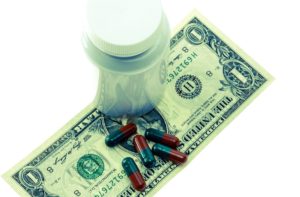
Both Teva and Glenmark entered deferred prosecution agreements (DPAs), in which each must undertake remedial measures. This includes having to divest their respective drug lines for pravastatin, “a widely used cholesterol medicine that was a core part of the companies’ price-fixing conspiracy,” the DoJ said.
Under its DPA, Teva also will donate $50 million worth of two generic drugs, clotrimazole and tobramycin, whose prices were affected by Teva’s criminal schemes, to humanitarian organizations that provide medication to U.S. citizens in need.
Both Teva and Glenmark have agreed, among other things, “to cooperate with the Department in the ongoing criminal investigations and resulting prosecutions, report to the Department on their compliance programs, and modify those compliance programs where necessary and appropriate.”
Case Background
Under the DPAs, Teva admitted to participating in three antitrust conspiracies that affected essential medicines — including pravastatin, clotrimazole, and tobramycin—while Glenmark admitted to participating in a conspiracy to fix the price of pravastatin.
In one conspiracy, Teva was alleged to have conspired with Glenmark, Apotex, and others to increase prices for pravastatin and other generic drugs. In May 202, Apotex admitted its role in the price-fixing scheme and was hit with a $24.1 million criminal penalty.
Under a second conspiracy, Teva was charged for its role in a conspiracy with Taro Pharmaceuticals, its former executive Ara Aprahamian, and others “to increase prices, rig bids and allocate customers of generic drugs, including clotrimazole, a medicine used to treat skin infections.
In July 2020, Taro paid a $205.7 million criminal penalty for its role in the antitrust scheme. Aprahamian was indicted in February 2020 and is awaiting trial.
And in a third conspiracy, Teva was charged for its role in a conspiracy with Sandoz and others to increase prices, rig bids, and allocate customers of generic medicines, including cystic fibrosis medicine tobramycin.
A former Sandoz executive pleaded guilty for his participation in the conspiracy in February 2020. Sandoz admitted to its role in the conspiracy and agreed to pay a $195 million penalty in March 2020.
Regarding Glenmark, the Antitrust Division in June 2020 charged Glenmark with price fixing for its role in a conspiracy affecting the prices of pravastatin and other generic drugs. In August 2020, a grand jury filed a superseding indictment against Glenmark and Teva for the same and similar conduct.
Enforcement Sweep
Under the terms of the DPAs, subject to court approval, a trial and prosecution will be deferred concerning the filed charges for the three-year terms of the DPAs or until after payment of the criminal penalties, whichever occurs later.
Teva and Glenmark will face prosecution if they violate the terms of the DPAs and, if convicted, they would likely face mandatory debarment from federal health care programs.
During its multi-year investigation, the Antitrust Division and its law enforcement partners uncovered price-fixing, bid-rigging and market-allocation schemes affecting many generic medicines. Seven generic pharmaceutical companies were charged for their participation in the schemes.
Including Teva and Glenmark, all seven companies have resolved their criminal charges, paying more than $681 million in criminal penalties.
Teva’s Response
In a prepared statement, and as described in the DPA, Teva said, “a single former employee, in three instances involving three separate customers between 2013 and 2015, agreed with competitors that Teva would not bid on an opportunity to supply that customer with a particular generic product,” and that “this former employee left the company in 2016.”
Teva added that it “fosters a culture of compliance, including with the antitrust laws, and is dedicated to conducting business with integrity and fairness. Teva has robust and consistent compliance controls in place designed to prevent this type of activity from reoccurring, and has committed, as part of the DPA, to maintain those controls going forward.” ![]()
Jaclyn Jaeger is a contributing editor at Compliance Chief 360° and a freelance business writer based in Manchester, New Hampshire.

